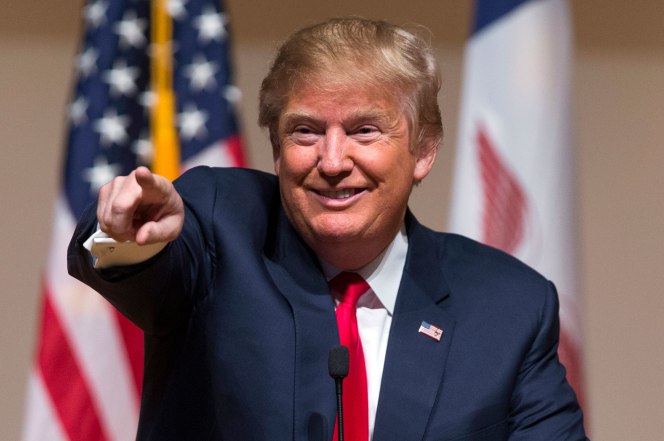Presidential Nominee Donald Trump comes to Gettysburg
The Gettysburgian does not officially support or endorse any candidate for president, but all students and organizations are welcome to submit personal opinions and endorsements to gentjo02@gettysburg.edu
By Alex Romano, Contributing Wrter
Roughly 153 years after President Abraham Lincoln delivered his celebrated Gettysburg Address in Soldiers’ National Cemetery, Republican presidential nominee Donald Trump laid out the agenda for his first 100 days in the executive office at the Eisenhower Hotel and Conference Center. The date was Saturday, October 22, 2016 when Trump took the stage and announced the list of objectives that he would pursue first as leader of the country: a grand total of 6 measures, 12 actions, and 10 bills that in enacting would presumably start the process of making America great again. The rally was closed to the public, so the only attendants present were supporters of Trump, which kept things smooth and civil for the candidate to reveal his plan with ease. Opening speakers were vice presidential nominee Mike Pence, who reaffirmed his role as straight man to Trump’s eccentricity; retired Lieutenant General Keith Kellogg, whose mere title added the patriotic vibe useful for the unveiling of a presidential candidate’s first 100-day plan; and former New York City Mayor Rudy Giuliani, who proudly self-identified as a “deplorable” and revved up the crowd with a visible confidence and self-assurance that only one who has spent some time with Donald Trump can possess. When Trump finally took the stage, anticipation was set high and the audience was enthusiastic, ready to hear what their guy would do for them when they put him in the White House on November 8.
And what the crowds heard was all of the substance Trump lacked at any and all of the three debates against Hillary Clinton last month. Trump’s policy package added up to 28 parts: 6 measures, 12 actions, and 10 acts to kick off his presidency on a high note. Key components included withdrawal from the Trans-Pacific Partnership, the proposal of a constitutional amendment to limit terms on each and every member of Congress, the green-lighting of the Keystone Pipeline, the “extreme vetting” of all immigrants from “terror-prone regions”, the repeal of Obamacare and its replacement with Health Savings Accounts among other new provisions, the construction of a physical wall to exclude illegal immigrants from entering the United States from Mexico and the forced reimbursement from the Mexican government for the wall, a Restoring Community Safety Act to make good on Trump’s promise for the strengthening of law and order, and the initiative to “Drain the Swamp” in Washington, DC, reinforcing Trump’s claims to being a fierce enemy of political corruption. He dedicated a good amount of time to elaboration, and then ditched the idea of trying to match Lincoln and reverted to pure Trump, lashing back at the “liars” accusing him of sexual harassment. Whatever message Donald Trump was trying to drive home in his speech, it was intercepted by his own wounded ego, and never landed with his audience, as his plan for his first 100 days in office was roundly derided for lacking cohesion and grace. But it was still a step up for Trump.
No criticism of the faults in Donald Trump’s Gettysburg address should detract from its strengths. He articulated a full, thoughtful, and specific plan to his audience, and did so with apparent sincerity. He was at last so comfortable to tell everybody just exactly what it was that they will get with President Trump to the extent that he revealed his mission for the first 100 days in front of a live audience. Of course, with the event being closed to the public, that meant that none of us liberal arts college kids had the chance to heckle him with trite, superficial comparisons to Hitler and paper his motorcade with Community Concern forms, so Trump played it safe with regard to the environment of his speech. But he tried to act presidential again, showing even more that he is up for the job. He broke his presidential streak, however, when he reverted to attacking Clinton and the women who came forward with sexual harassment allegations, making his speech only half-effective, and his attempt at seeming presidential only half-effective. America should ask itself, even as it ponders the shadiness of Hillary Clinton’s e-mail imbroglio, if it is content to have its next leader appear to be only half-presidential.

